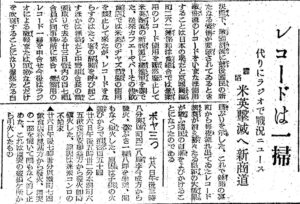This is a story about a restaurant association in Jongno-gu, Seoul which not only banned American and British jazz music from its cafes, bars, and restaurants, but also banned all in-store music played on phonograph records and replaced it with Imperial Japanese military songs and Imperial Japanese military news propaganda. That would have certainly ruined the ambience of the restaurants and added yet another oppressive element to the miserable reality of living under Imperial Japanese colonial rule in wartime Korea.
(Translation)
Gyeongseong Ilbo (Keijo Nippo) February 27, 1943
Phonograph records are to be wiped out!
Listen to military news broadcasts on the radio instead!
Jongno-gu: The New Way of Business to destroy the U.S. and Britain
Under the circumstances of the war, when the people on the home front were required to make a new resolve to destroy the enemy nations, they felt that playing enemy phonograph records in this day and age would be a shame on Japan. Therefore, the Jongno Japanese and Western Restaurants Association, located at 262 Gwancheol-dong, Jongno-gu, Seoul, decided to abolish the use of phonograph records for business use, and instead play Imperial Japanese military marches to herald the New Way of Business to destroy the U.S. and Britain.
On February 23, led by association president Nakano, 107 members of the association gathered at the association office. The association had previously banned the use of American and British jazz recordings in cafes, bars, and other eating establishments, but believing that playing phonograph records would only arouse the intoxication of customers and would not be of any benefit at all, they agreed to wipe out all phonograph records for business use. From now on, they would only play war reports and military songs on the radio, showing their strict self-restraint.
This means that the nightly music that used to play on phonograph records on the backstreets of Jongno-gu will disappear, and the fighting national people will be called upon to show self-restraint by the military news broadcasts lauding the brilliant results of the Imperial Army's great battles.
Source: https://www.archive.org/details/kjnp-1943-02-27 (page 3)
(Transcription)
京城日報 1943年2月27日
レコードは一掃
代りにラジオで戦況ニュース
鐘路:米英撃滅へ新商道
決戦下、敵国潰滅に銃後国民の新たなる覚悟が要望されているとき、適性流のレコードをいまなお使用することは日本の恥だと京城貫鉄町二六二鐘路和洋食組合では営業用のレコード使用を断然廃止して米英撃滅の新商道に総進軍を奏でた。
従来カフェーやバーその他飲食店では米英のジャズ音盤の使用を禁止して来たが、レコードをならすのは、ただ客の酔興を呼び起こすほかは無益だと中野組合長の音頭取りで去る二十三日、管内の百七組合員が同事務所に集合。営業用のレコード一掃を申合せ、今後はラジオによる戦報または軍歌などだけを吹奏することになり、厳然たる自粛ぶりを示した。
これで鐘路の裏町から毎夜流れ出ていたレコード演奏が消え、赫々たる皇軍の大戦果が戦う国民の自粛をよびかけることになったのである。





No comments:
Post a Comment